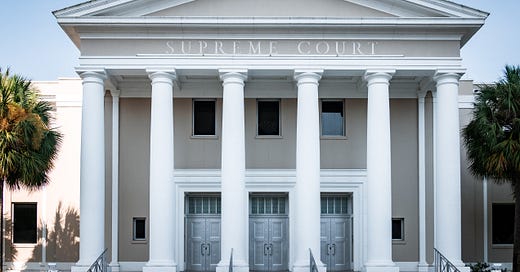Florida Supreme Court affirms Matthew Caylor's sentence of death
On Thursday, as part of its regular release of opinions, the Florida Supreme Court issued its decision in Caylor v. State, affirming Caylor's sentence of death.
On Thursday, as part of its regular release of opinions, the Florida Supreme Court issued its decision in Caylor v. State. The Court affirmed Matthew Caylor’s sentence of death on resentencing.
This was Caylor’s direct appeal from his February 2023 resentencing in which he was resentenced to death. Justice Francis authored the decision.
Before the resentencing, Caylor waived various rights related to his resentencing. Four months after his new penalty phase, Caylor “moved to withdraw his prior waivers of his penalty phase jury, his physical presence, and mitigation. The State vehemently objected, citing among other reasons, that the attempted withdrawal was an untimely delay tactic.” At a hearing on his motion, Caylor “testified that his waivers should be withdrawn because the reason for the waivers was gone: he had only waived his rights to honor his promise to the victim’s mother[, who had since died,] not to put her through a lengthy proceeding.” After the hearing, the trial court denied “Caylor’s motion to withdraw the waiver of the penalty phase jury, explain[ing] that Caylor’s motion filed four months after the penalty phase was in bad faith to cause a delay, as further shown by Caylor’s history of waffling on his earlier waivers. The court also rejected Caylor’s argument that the death of the victim’s mother constituted good cause to withdraw the waivers because he made that promise to the whole family, not just the mother. However, the court permitted Caylor to be present [at the resentencing] and [to] present mitigation evidence.”
On appeal, Caylor raised three issues. Two related to the waivers.
“First, Caylor [argued] the trial court abused its discretion by denying his motion to withdraw his jury waiver following his penalty phase as untimely filed in bad faith for the purpose of delay.” The Court determined “[t]he trial court’s findings that Caylor’s post-penalty phase request was made in bad faith and for the purpose of obtaining a delay are supported by the record evidence of Caylor’s conduct before the penalty phase where, for nearly a year, he repeatedly waived his rights, only to change his mind and seek withdrawal. And most significantly, these findings are supported by Caylor’s four-month delay in seeking the withdrawal of his jury waiver after the bench penalty phase.” Therefore, the Court concluded ”the trial court did not abuse its discretion by denying Caylor’s request to withdraw his waiver of the penalty phase jury.”
Caylor further argued “the trial court erred in refusing to grant his post-penalty phase withdrawal request because his August 2021 jury waiver was based on misinformation” because “he did not know the victim’s mother died until the bench penalty phase, and therefore, his August 2021 waiver was made unknowingly and involuntarily because he only waived the jury to spare the victim’s mother a painful sentencing process.” The Court reasoned that “Caylor’s argument is unconvincing because the death of the victim’s mother cannot retroactively negate Caylor’s understanding of the nature of his right to have a penalty phase jury at the time he waived it.” The Court further added: “Caylor’s internal motivation about the victim’s mother and ignorance of her death does not go to the nature of, nor his understanding about, his right to a jury.”
Second, Caylor argued “the trial court erred by denying his request to withdraw his mitigation waiver, again, arguing the waiver was not knowing and voluntary in light of the death of the victim’s mother.” Similar to its reasoning on the first issue above, the Court denied this claim saying “Caylor’s desire to spare the victim’s mother is not constitutionally relevant to his understanding of his right to waive mitigation.”
Third, Caylor argued “that the State must prove the aggravating factors outweigh the mitigating circumstances beyond a reasonable doubt.” Referencing its 2023 decision in Wells v. State, the Court denied this claim, writing: “We recently reaffirmed our view that proof beyond a reasonable doubt is not required in determining the relative weight of the aggravators and mitigators because these sentencing determinations are neither elements of an offense nor their functional equivalent.”
Accordingly, the Court affirmed Caylor’s sentence of death. Justice Labarga concurred in result, reiterating his disagreement with the Court abandoning its proportionality review on direct appeal. (More on that here.)
The full decision can be accessed on the Court’s website here.




